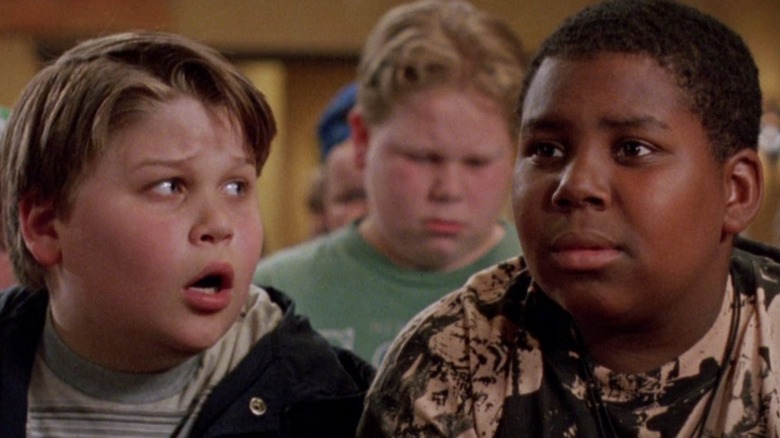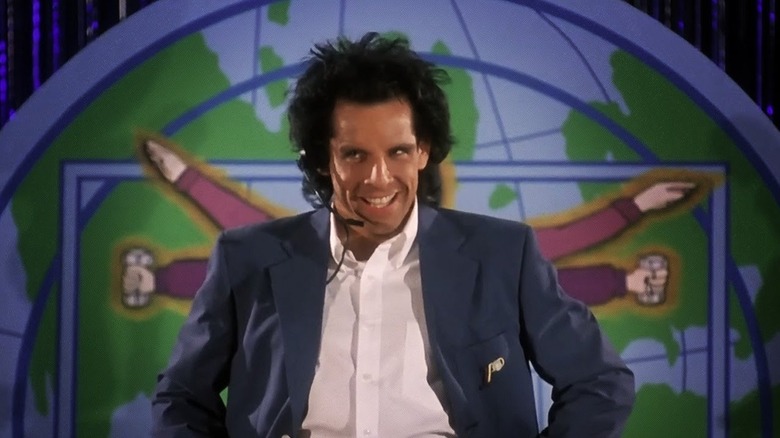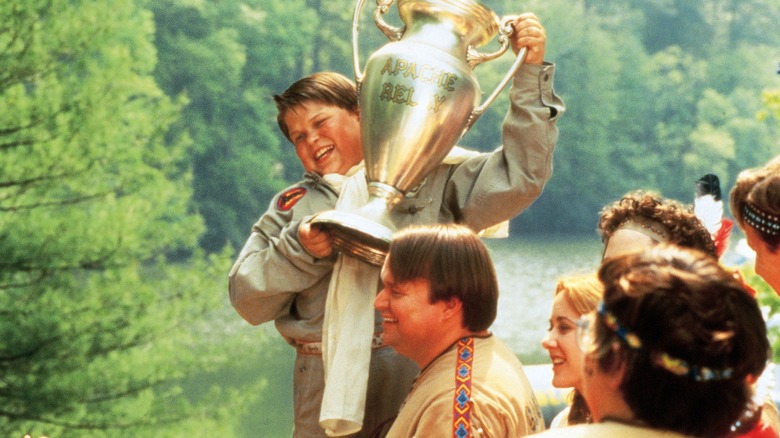The Daily Stream: Heavyweights Understood Fat Characters Better In 1995 Than Hollywood Does Today
(Welcome to The Daily Stream, an ongoing series in which the /Film team shares what they've been watching, why it's worth checking out, and where you can stream it.)
The Movie: "Heavyweights"
Where You Can Stream It: Disney+
The Pitch: Teenager Gerry Garner (Aaron Schwartz) is excited to hang out with his friends and enjoy his summer vacation, only to come home from the last day of school to an intervention from his parents regarding his weight. Without his knowledge or consent, Gerry is being sent off to Camp Hope, a weight loss camp for boys run by The Bushkins (Jerry Stiller and Anne Meara). Gerry is initially against the idea, but after meeting veteran camper Roy (Kenan Thompson) and the enthusiastic camp counselor Pat Finley (Tom McGowan), Gerry thinks this summer might not be so bad after all.
Unfortunately, all of that changes when the Bushkins announce that they've been forced to sell the camp after filing for bankruptcy and that Camp Hope will now be the testing grounds for a new children's weight-loss infomercial plan helmed by the villainous fitness entrepreneur Tony Perkis Jr. (Ben Stiller). Now, it's up to Gerry, the campers, and the old-school camp staff to take Tony Perkis Jr. and his chiseled abs down and restore Camp Hope to its loving and affirming former glory.
Why it's essential viewing
In the year of our lord 2022, I regret to announce that the entertainment industry still sucks at handling fatness on screen. Thin actors don fat suits because heaven forbid a fat person actually gets a starring role, fat characters are often relegated to punchlines or inspiration porn, and don't even get me started on the trend of "fatness as tragedy." Despite the fact that "Heavyweights" is a film about kids at a fat camp being tormented by a fatphobic, fitness-obsessed psychopath, fatness and fat bodies are never treated like a punchline. Even as Ben Stiller delivers a career-best performance filled with pointed barbs and cruel descriptors for their husky frames, the film never once takes the side of the fatphobic jerks.
As a kid, I watched "Heavyweights" non-stop with my friends, feeling seen and affirmed by the campers, and vindicated as those who treated them cruelly were met with accountability. That's because deep down, I knew that "Heavyweights" was just a movie. The poetic justice I so desperately craved in my real life was likely never going to happen. Bullies were going to continue calling me "fat," and they were going to get away with it at best, and be encouraged to continue at worst.
As an adult, I look at "Heavyweights" and recognize the film as a groundbreaking addition to the canon of fat cinema for daring to acknowledge that get-thin-quick schemes are harmful, fatphobia is cruel, and that the size of your body has absolutely nothing to do with the measure of your character. None of this should be revolutionary, but almost 30 years later, few films can hold a candle to the humanity of "Heavyweights."
Finding peace in a fat body
"Heavyweights" was written and directed by frequent Adam Sandler collaborator Steve Brill ("The Mighty Ducks," "Mr. Deeds," "Without a Paddle") in his directorial debut, and co-written with comedy great Judd Apatow in his first screenwriting feature. Perhaps it was the result of taking big creative swings as first-timers, but both Brill and Apatow are firing on all cylinders. The moments of peak Tony Perkis Jr. villainy are shot like a horror movie, the food fight scene looks like the greatest party we were never invited to, and the summer camp relay at the end of the film is filled with all of the tension of a great underdog sports movie.
Critics didn't know what to make of "Heavyweights" when it was released, which is likely why the film only boasts a 29% critic rating on Rotten Tomatoes compared to the much more favorable 77% audience rating. Many claimed the film relied on fat stereotypes, which tells me they fundamentally misunderstood the scope of the film. If anything, "Heavyweights" mocks stereotypical fitness gurus like Tony Little. Tony Perkis Jr. and camp counselor Lars (the extremely funny Tom Hodges) often use "fat" as a way to put down the kids, but when the kids interact with each other, it's just a word to describe themselves.
"Fat" has been treated like a dirty word for far too long, with phrases like "curvy," "thick," "fluffy," "big-boned," and "plus-sized" being used in place of "fat" out of fear that it will be seen as hurtful. Hearing Roy matter-of-factly tell Gerry he knows he's going to fat camp "because you're fat" could be seen as a punchline, but for a lot of fat kids growing up, it was a rallying cry.


